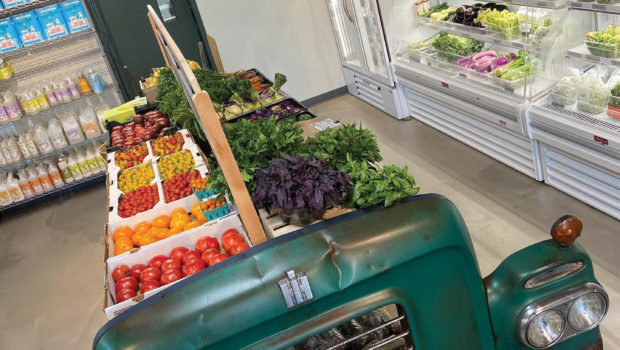By Aviva Luttrell, correspondent
Worcester County businesses, like millions of others globally, are facing a new reality: They must adapt amid the COVID-19 pandemic, or risk closing their doors permanently.
Many are meeting the challenges head-on, and in a variety of ways. But what of the common threads across different industries? Accessibility, mobile-based commerce and, ultimately, safety and peace of mind for their customers.
Take Maker to Main, for example.
The small downtown Worcester grocery store opened just three weeks before non-essential businesses were ordered to close in mid-March. Owner Lynn Cheney bid farewell to her staff – many of whom couldn’t work without childcare – and began running the operation herself. Within five days, she had set up an online ordering system for curbside pickup and soon brought in two others to help.
Cheney said the online ordering system roll-out was filled with glitches, but her customers have been supportive throughout the process. “We just did it very prematurely because we already saw that people, within days, had cleaned out grocery store shelves,” she said.
But there was also a silver lining. Between curbside pickup and Maker to Main’s small size, Cheney said it became a place where people felt comfortable shopping. While Instacart and other grocery delivery services experienced delays due to a surge in demand, Cheney was able to fulfill orders the same day, on average.
“I didn’t have depleted shelves and logistical challenges with food supplies. My food system is local, and the aspect of people hoarding toilet paper or flour to make copious amounts of bread wasn’t a problem,” she said. “I had all of this stuff, and so many people tried us and felt like it was an opportunity and a safe place.”
Last month, she was able to resume her wholesale operation, which distributes locally grown food to area restaurants, and has brought back her entire six-person team.
For Auburn-based Atlas Distributing Inc., the pandemic has represented a substantial shift in how daily business is carried out. The beverage distributor, which serves 1,800 liquor-licensed accounts and 1,200 non-licensed accounts throughout the region, immediately took all of its sales representatives off the street and asked them to begin working remotely.
“Our guiding principle was to do the best and safest things for our team members and customers, and our brewery partners, too,” said Jon Salois, vice president of sales.
Now, as the economy begins to reopen, the team is still working virtually and has set up an online ordering portal for customers – a new feature for the 87-year-old company. “It pushed us in a technology direction,” Salois said.
Domitek is among the area IT companies helping businesses roll out remote solutions during the pandemic.
Founder and President Libis Bueno says his 10-person staff has remained busy over the past several months, helping clients adapt to changing needs – especially security concerns and virtual workspaces.
Domitek has migrated many of its clients to “the cloud” and saw a spike in demand for VoIP phone systems – which allow users to make phone calls using an Internet-connected computer – as well as security and alarm systems for unoccupied offices. The company has also worked with a vendor to supply thermal cameras that can detect fevers, and is working on creating a touchless door-entry system.
“We’re a system integrator in helping businesses put in place secure infrastructure, but also putting in place solutions that can help open businesses back up,” Bueno said.
At the Worcester Public Market, President and Founder Allen Fletcher was able to take advantage of a Payroll Protection Loan to help support his small staff. The market’s bank was also flexible on payments, he said, which allowed the market to decide, early on, not to charge its 29 vendors rent while the establishment was closed.
Fletcher even picked up several new vendors before the market reopened in June with numerous social distancing guidelines in place. Since then, he’s seen a steady flow of patrons, which he expects to increase gradually. New outdoor tables have helped, Fletcher said, and some vendors have debuted online ordering systems and curbside pickup.
The market is still dependent on walk-in traffic, according to Fletcher, but its vendors are doing a good amount of business with the number of people coming in the door.
“It’s small compared to what it used to be, but under the current circumstances we can’t have that amount of crowding, anyway,” he said, adding that he remains optimistic about the business community’s future. “Part of it is such an incredible relief to be back in business after a long period of suspended animation. That feels great.”





